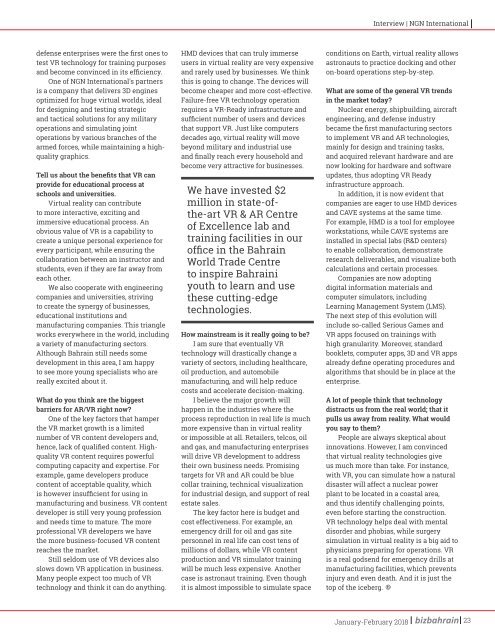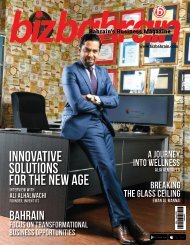Create successful ePaper yourself
Turn your PDF publications into a flip-book with our unique Google optimized e-Paper software.
Interview | NGN International<br />
defense enterprises were the first ones to<br />
test VR technology for training purposes<br />
and become convinced in its efficiency.<br />
One of NGN International's partners<br />
is a company that delivers 3D engines<br />
optimized for huge virtual worlds, ideal<br />
for designing and testing strategic<br />
and tactical solutions for any military<br />
operations and simulating joint<br />
operations by various branches of the<br />
armed forces, while maintaining a highquality<br />
graphics.<br />
Tell us about the benefits that VR can<br />
provide for educational process at<br />
schools and universities.<br />
Virtual reality can contribute<br />
to more interactive, exciting and<br />
immersive educational process. An<br />
obvious value of VR is a capability to<br />
create a unique personal experience for<br />
every participant, while ensuring the<br />
collaboration between an instructor and<br />
students, even if they are far away from<br />
each other.<br />
We also cooperate with engineering<br />
companies and universities, striving<br />
to create the synergy of businesses,<br />
educational institutions and<br />
manufacturing companies. This triangle<br />
works everywhere in the world, including<br />
a variety of manufacturing sectors.<br />
Although Bahrain still needs some<br />
development in this area, I am happy<br />
to see more young specialists who are<br />
really excited about it.<br />
What do you think are the biggest<br />
barriers for AR/VR right now?<br />
One of the key factors that hamper<br />
the VR market growth is a limited<br />
number of VR content developers and,<br />
hence, lack of qualified content. Highquality<br />
VR content requires powerful<br />
computing capacity and expertise. For<br />
example, game developers produce<br />
content of acceptable quality, which<br />
is however insufficient for using in<br />
manufacturing and business. VR content<br />
developer is still very young profession<br />
and needs time to mature. The more<br />
professional VR developers we have<br />
the more business-focused VR content<br />
reaches the market.<br />
Still seldom use of VR devices also<br />
slows down VR application in business.<br />
Many people expect too much of VR<br />
technology and think it can do anything.<br />
HMD devices that can truly immerse<br />
users in virtual reality are very expensive<br />
and rarely used by businesses. We think<br />
this is going to change. The devices will<br />
become cheaper and more cost-effective.<br />
Failure-free VR technology operation<br />
requires a VR-Ready infrastructure and<br />
sufficient number of users and devices<br />
that support VR. Just like computers<br />
decades ago, virtual reality will move<br />
beyond military and industrial use<br />
and finally reach every household and<br />
become very attractive for businesses.<br />
We have invested $2<br />
million in state-ofthe-art<br />
VR & AR Centre<br />
of Excellence lab and<br />
training facilities in our<br />
office in the Bahrain<br />
World Trade Centre<br />
to inspire Bahraini<br />
youth to learn and use<br />
these cutting-edge<br />
technologies.<br />
How mainstream is it really going to be?<br />
I am sure that eventually VR<br />
technology will drastically change a<br />
variety of sectors, including healthcare,<br />
oil production, and automobile<br />
manufacturing, and will help reduce<br />
costs and accelerate decision-making.<br />
I believe the major growth will<br />
happen in the industries where the<br />
process reproduction in real life is much<br />
more expensive than in virtual reality<br />
or impossible at all. Retailers, telcos, oil<br />
and gas, and manufacturing enterprises<br />
will drive VR development to address<br />
their own business needs. Promising<br />
targets for VR and AR could be blue<br />
collar training, technical visualization<br />
for industrial design, and support of real<br />
estate sales.<br />
The key factor here is budget and<br />
cost effectiveness. For example, an<br />
emergency drill for oil and gas site<br />
personnel in real life can cost tens of<br />
millions of dollars, while VR content<br />
production and VR simulator training<br />
will be much less expensive. Another<br />
case is astronaut training. Even though<br />
it is almost impossible to simulate space<br />
conditions on Earth, virtual reality allows<br />
astronauts to practice docking and other<br />
on-board operations step-by-step.<br />
What are some of the general VR trends<br />
in the market today?<br />
Nuclear energy, shipbuilding, aircraft<br />
engineering, and defense industry<br />
became the first manufacturing sectors<br />
to implement VR and AR technologies,<br />
mainly for design and training tasks,<br />
and acquired relevant hardware and are<br />
now looking for hardware and software<br />
updates, thus adopting VR Ready<br />
infrastructure approach.<br />
In addition, it is now evident that<br />
companies are eager to use HMD devices<br />
and CAVE systems at the same time.<br />
For example, HMD is a tool for employee<br />
workstations, while CAVE systems are<br />
installed in special labs (R&D centers)<br />
to enable collaboration, demonstrate<br />
research deliverables, and visualize both<br />
calculations and certain processes.<br />
Companies are now adopting<br />
digital information materials and<br />
computer simulators, including<br />
Learning Management System (LMS).<br />
The next step of this evolution will<br />
include so-called Serious Games and<br />
VR apps focused on trainings with<br />
high granularity. Moreover, standard<br />
booklets, computer apps, 3D and VR apps<br />
already define operating procedures and<br />
algorithms that should be in place at the<br />
enterprise.<br />
A lot of people think that technology<br />
distracts us from the real world; that it<br />
pulls us away from reality. What would<br />
you say to them?<br />
People are always skeptical about<br />
innovations. However, I am convinced<br />
that virtual reality technologies give<br />
us much more than take. For instance,<br />
with VR, you can simulate how a natural<br />
disaster will affect a nuclear power<br />
plant to be located in a coastal area,<br />
and thus identify challenging points,<br />
even before starting the construction.<br />
VR technology helps deal with mental<br />
disorder and phobias, while surgery<br />
simulation in virtual reality is a big aid to<br />
physicians preparing for operations. VR<br />
is a real godsend for emergency drills at<br />
manufacturing facilities, which prevents<br />
injury and even death. And it is just the<br />
top of the iceberg.<br />
January-February <strong>2018</strong><br />
23

















